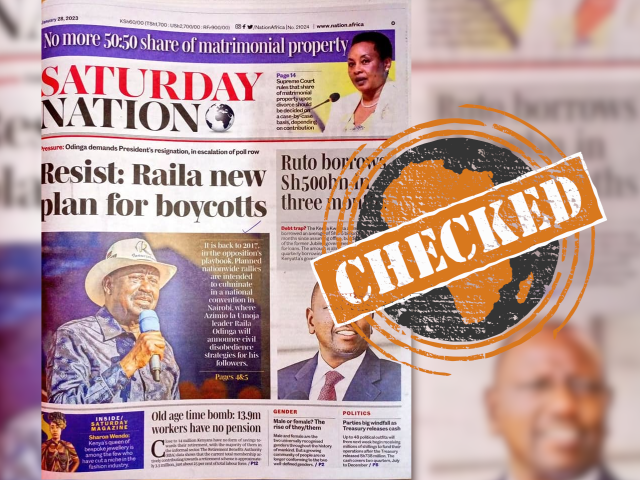President Jacob Zuma’s State of the Nation Address was delayed for more than an hour as members of opposition parties introduced various points of order.
The chief spokesman of the Economic Freedom Fighters, Mbuyiseni Ndlozi, added two. Here we verify the accuracy of claims he made during the course of it.
Pointing to two men dressed in blue uniforms stationed inside the doors of the national assembly, Ndlozi told the joint sitting of parliament that “those two people there at the door must leave the house. They don’t belong here. Even the justices are seated over there.”
Darren Olivier, senior correspondent for the African Defence Review, told Africa Check via email that the “two South African air force colonels” next to the doors were the “president’s aides-de-camp, and traditionally they have always been allowed inside parliament. Photos from previous SONAs show them in the same location, with last year’s aides-de-camp being from the South African army.”
Oliver says this is “one of the traditional norms and protocols inherited with our system. For instance, in other commonwealth countries, such as Australia, the head of state is almost always accompanied by either one or two military aides-de-camp into the houses of parliament.
“In general, aides-de-camp in most countries, including South Africa, wear gold ropes, the aiguillette, from one of their shoulders and are unarmed except for ceremonial swords or daggers where those are still used. In other words, [their presence is] not unusual and a common feature of parliamentary traditions.”
These screenshots show aides-de-camp in attendance at previous State of the Nation addresses.
Olivier said he was not sure whether the presence of the aides, as well as other ceremonial military presences within the parliamentary precinct, was “codified in law or a specific protocol”, but that he would update Africa Check with this information.
Africa Check is still attempting to contact the national defence force for comment. We will update this report once we receive a response. - Nechama Brodie
Just before calling Zuma a “constitutional delinquent”, Ndlozi said that South African citizens are “not allowed, according to the constitution, to stand for any office if we have a criminal record” - whether it is parliament, a provincial legislature or local council.
Section 47 of South Africa’s constitution stipulates the rules regarding who can hold office. This section states that anyone who is qualified to vote for the national assembly - that is, South African citizens 18 years or older - can be a member of the assembly.
Additionally, it states that “unrehabilitated insolvents” and “anyone declared of unsound mind by a court of the republic” cannot stand for office.
The provision also excludes anyone who was convicted of an offence and sentenced to more than 12 months’ imprisonment without the option of a fine, either in South Africa or outside of it - if the offence would have been a criminal one in South Africa. But when the conviction is being appealed, or the appeal is being decided on, this disqualification does not apply.
Finally, the disqualification only applies for five years. Five years after someone has served a prison sentence, the person again qualifies to hold elected office.
The separate requirements to hold office in the provincial legislature and municipal councils were explained to Africa Check by the chief communications officer of the Electoral Commission of South Africa, Kate Baphela.
She said that the requirements to be elected to a provincial legislature are the same as those for the national assembly.
For municipal councils, every citizen who is qualified to vote for a municipal council is allowed to be a member of the council. However, this excludes anyone appointed and paid by a municipality, another office of the state to provide a service or anyone who is disqualified from voting in the national assembly for the reasons given before. - Vinayak Bhardwaj
Additional reading
https://africacheck.org/reports/facts-alternative-facts-zumas-10th-state-nation-address-checked/



Add new comment